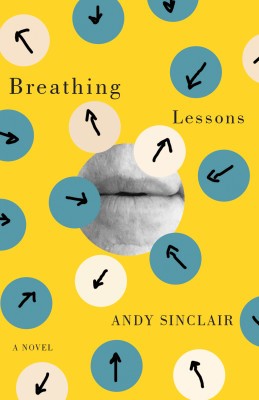Breathing Lessons is a timely novel. It feels contemporary, and – as an account of the intimate life of Henry Moss, identified as a “homosexual everyman” on the back cover – it deals with questions that could only be broached now, when gay people are making their way into the social mainstream and facing the issues that this inevitably involves.

Breathing Lessons
Andy Sinclair
Esplanade Books
$18.00
paper
180pp
9781550653977
Such fondness for “gay edginess” aside, however, Moss longs for a more conventional romantic relationship, and time and again Breathing Lessons works through this in sharply rendered depictions of loneliness, compulsion, and unrequited desire. Paradoxically, it is the protagonist’s semi-clarity that highlights what is problematic here: though Henry’s emotional landscape is well drawn, he doesn’t grow or develop much. He seems to remain trapped in his unfulfilling patterns. This, from the final pages of the book, is particularly telling:
“Young people are more concerned with what’s going on around them. It’s only as we get older that we start to look within.”
I wonder why anyone would ever want to do that.
I’ll admit I was having difficulties.
For all his acuity, Moss seems unable to resolve his contradictions; he commits to neither the anarchy of desire nor the comforts of the domestic. Of course, novels do not always require resolution, some simply draw a portrait, and the portrait here is sharp; still, a curious stasis reigns in these pages, one as much a matter of language as plot. One looks for real movement, but Moss seems to not even learn much from his experiences. One longs for him to choose something – even indecision – rather than to simply fall into things, and his troubling passivity is further heightened by a flatness in the characterization. Despite Moss’s mental sharpness, he rarely calls himself to task and, curiously for a book whose sexual frankness has been noted, this flatness marks even the erotic passages. And there are more ambiguities. For example, the book is tagged “novel” though it’s structurally closer to a collection of linked stories that skips back and forth in setting and chronology, which might confound some readers’ expectations. The title may perplex some, too, given it is far better known in connection with Anne Tyler’s Pulitzer Prize–winning fiction. Still, despite these problems, Breathing Lessons is an interesting dramatization of a particularly contemporary situation and, as such, will find welcoming readers. mRb






0 Comments